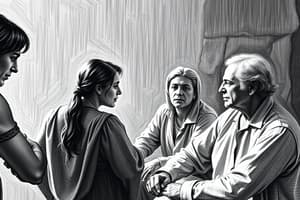Podcast
Questions and Answers
Cultural variation exists across different ______.
Cultural variation exists across different ______.
societies
Power dynamics shape social interaction and ______.
Power dynamics shape social interaction and ______.
decision-making
Conformity is adherence to social norms and ______.
Conformity is adherence to social norms and ______.
expectations
Technological advancements and economic shifts are sources of ______.
Technological advancements and economic shifts are sources of ______.
Group dynamics involve processes of social influence, leadership, and ______.
Group dynamics involve processes of social influence, leadership, and ______.
Individuals and society are ______, influencing each other in complex ways.
Individuals and society are ______, influencing each other in complex ways.
Socialization is the process by which individuals learn and internalize social ______, values, and beliefs.
Socialization is the process by which individuals learn and internalize social ______, values, and beliefs.
Primary socialization occurs in early ______, while secondary socialization continues throughout life.
Primary socialization occurs in early ______, while secondary socialization continues throughout life.
Social structures are patterned arrangements of roles, statuses, and ______ in society.
Social structures are patterned arrangements of roles, statuses, and ______ in society.
Social interaction involves verbal and nonverbal cues, symbols, and shared ______.
Social interaction involves verbal and nonverbal cues, symbols, and shared ______.
Social inequality refers to the unequal distribution of resources, opportunities, and ______ among different groups in society.
Social inequality refers to the unequal distribution of resources, opportunities, and ______ among different groups in society.
Culture shapes individual values, beliefs, and ______.
Culture shapes individual values, beliefs, and ______.
Symbolic interactionism focuses on how individuals develop their understanding of the world through ______.
Symbolic interactionism focuses on how individuals develop their understanding of the world through ______.
Flashcards
Cultural Variation
Cultural Variation
Differences in values, beliefs, and behaviors across societies.
Power Dynamics
Power Dynamics
How power influences social interactions and decisions within a society.
Social Norms
Social Norms
Rules and expectations for behavior in a society.
Group Dynamics
Group Dynamics
Signup and view all the flashcards
Social Change
Social Change
Signup and view all the flashcards
Individual and society
Individual and society
Signup and view all the flashcards
Socialization
Socialization
Signup and view all the flashcards
Social Structure
Social Structure
Signup and view all the flashcards
Social Interaction
Social Interaction
Signup and view all the flashcards
Social Inequality
Social Inequality
Signup and view all the flashcards
Culture's effect on behavior
Culture's effect on behavior
Signup and view all the flashcards
Agents of Socialization
Agents of Socialization
Signup and view all the flashcards
Socialization stages
Socialization stages
Signup and view all the flashcards
Study Notes
Introduction to Individual and Society
- Individuals and society are interconnected, influencing each other in complex ways.
- Understanding individual behavior requires considering the social context.
- Human actions are shaped by social norms, values, and expectations.
- Social structures and institutions affect individuals' opportunities and life choices.
- Societies are comprised of individuals interacting and forming relationships.
Socialization
- Socialization is the process by which individuals learn and internalize social norms, values, beliefs.
- This process shapes personality, behavior, and cultural identity.
- Agents of socialization include family, peers, education, media, and religion.
- Socialization varies across cultures and time periods.
- Primary socialization occurs in early childhood; secondary socialization continues throughout life.
Social Structure and Institutions
- Social structures are patterned arrangements of roles, statuses, and institutions in society.
- They provide a framework for social interaction and organize social life.
- Institutions (e.g., family, education, government, religion) are key components of social structure.
- They establish norms, values, and expectations surrounding crucial societal functions.
- These structures influence individual opportunities and limitations.
Social Interaction
- Social interaction is the process of individuals communicating and exchanging meaning.
- It involves verbal and nonverbal cues, symbols, and shared understandings.
- Social exchange theory examines how individuals make decisions in social interactions.
- Symbolic interactionism focuses on how individuals develop their understanding of the world through interactions.
- Social exchange and symbolic interaction shape individual perceptions of themselves and others within a culture.
Social Inequality
- Social inequality is the unequal distribution of resources, opportunities, and power among different social groups.
- Factors influencing inequality include class, race, gender, and ethnicity.
- Inequality results in social stratification, where groups are ranked hierarchically.
- Stratification impacts access to education, employment, and healthcare.
- Social inequality can cause conflict or drive social change.
Culture and Individual Behavior
- Culture shapes individual values, beliefs, and behaviors.
- Cultural norms dictate appropriate actions and interactions.
- Cultural variation exists across different societies.
- Values and beliefs are critical to individual and collective identities.
- Understanding cultural differences is vital for effective intercultural interaction.
Power and Influence
- Power dynamics shape social interaction and decision-making.
- Power imbalances exist between individuals and groups.
- Authority figures and social hierarchies influence individuals.
- Power structures vary across societies, affecting opportunities and expectations.
- Historical, social, and economic factors shape power structures.
Conformity and Deviance
- Conformity is adherence to social norms and expectations.
- Deviance is behavior violating social norms or rules.
- Societies use sanctions to control deviance.
- Both conformity and deviance are influenced by social context.
- Deviance can drive social change and challenge existing norms.
Group Dynamics
- Groups are collections of individuals interacting, sharing a sense of identity or purpose.
- Group dynamics involve social influence, leadership, and conflict.
- Group membership affects individual behavior and attitudes.
- Individuals within a group have varying roles and impacts.
- Groups possess different internal structures and relationships.
Social Change
- Societies are constantly changing due to internal and external factors.
- Social movements and revolutions exemplify significant social change.
- Technological advancements, economic shifts, and cultural diffusion are sources of change.
- Change can lead to both progress and challenges.
- Adaptation and social progress are multifaceted and complex processes.
Studying That Suits You
Use AI to generate personalized quizzes and flashcards to suit your learning preferences.




